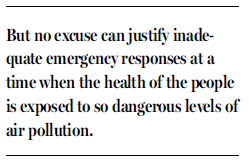
Given the uncontrollability of weather conditions and the fairly long time it will take for the country to shift away from its heavy reliance on coal as the major source of energy, it is unrealistic to expect immediate effects in reducing such smog.
Nevertheless, the dire fact that readings of the tiny PM2.5 particles, which are especially harmful to human health, have unprecedentedly reached more than tens of times the safe level set by the World Health Organization should justify a smarter emergency response than a stubborn insistence on issuing only an orange alert, instead of the red alert that is currently reserved for more than 72 hours of the heaviest level of air pollution.
It is unclear why local officials failed to issue the highest level of alert as the readings soared off the charts. They may have wanted to avoid the inconvenience and cost of reduced traffic and production activities, or the embarrassment of a red alert that would bear testimony to the serious air pollution problem in the Chinese capital. But no excuse can justify inadequate emergency responses at a time when the health of the people is exposed to so dangerous levels of air pollution.
By issuing a first red alert, more than half cars in the city would be banned from the roads every day and many factories and construction sites would be ordered to reduce or stop work.
If there is a silver lining in the heavy smog, it should be the emerging chance policymakers can seize to galvanize as much public support as possible and the public's participation in what promises to be a long hard fight against air pollution.
Beijing's determination to introduce the world's strictest emissions standards in 2017 and subsidize energy-saving household appliances in the coming three years all speak of the municipal government's commitment to ending the long-term growth of pollution.
But in the face of pollution crises such as the recent smog, policymakers must show more common sense and flexibility in responding adroitly and adequately to the situation rather than sticking to the regulations word for word.
The author is a senior writer with China Daily.
zhuqiwen@chinadaily.com.cn

I’ve lived in China for quite a considerable time including my graduate school years, travelled and worked in a few cities and still choose my destination taking into consideration the density of smog or PM2.5 particulate matter in the region.